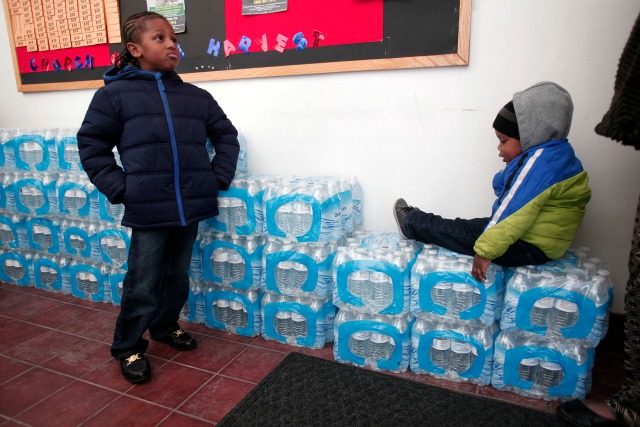Michael Moore Asks America To Stop Sending Bottled Water To Flint And 'Revolt'
By Mae Rice in News on Jan 29, 2016 8:37PM

FLINT, MI - JANUARY 17: Justin Roberson (L), age 6, of Flint, Michigan and Mychal Adams, age 1, of Flint wait on a stack of bottled water at a rally where the Rev. Jesse Jackson was speaking about about the water crises at the Heavenly Host Baptist Church January 17, 2016 in Flint, Michigan. U.S. President Barack Obama declared a federal emergency in Michigan, which will free up federal aid to help the city of Flint with lead contaminated drinking water. Michigan Gov. Rick Snyder requested emergency and disaster declarations after activating the National Guard to help the American Red Cross distribute water to residents. (Photo by Bill Pugliano/Getty Images)
There are thousands of valid reasons to love, hate, and love-hate Michael Moore, but one thing is definitively true: he made a movie about the structural obstacles facing Flint, Michigan long before the city’s water crisis that attracted national attention. His documentary on the city, Roger & Me, came out in 1989, and focused on General Motors plant closures throughout the city.
Now, Moore can claim more plausibly than most that he has Flint's interests at heart, and he made some interesting points about the city’s current crisis—which has prompted various levels of government to declare a cascade of emergencies—in a “letter to America” on his website, in which he advocates for political action over shipments of bottled water—a stopgap measure at best.
Moore starts by breaking down the effects of lead poisoning (and booting peppy, can-do spirit out the window). He writes:
The damage is permanent. There is no medicine you can send, no doctor or scientist who has any way to undo the harm done to thousands of babies, toddlers and children (not to mention their parents). They are ruined for life, and someone needs to tell you the truth about that. They will, forever, suffer from various neurological impediments, their IQs will be lowered by at least 20 points, they will not do as well in school and, by the time they reach adolescence, they will exhibit various behavioral problems that will land a number of them in trouble, and some of them in jail.
“Ruined for life” is a cruel characterization of mentally impaired people—come on, Michael!—but his point that the damage is done nevertheless feels instructive.
Moore goes on to dissect the specific problems with water bottle donation, though he credits people who’ve donated water to the city (including Mark Wahlberg and Diddy, who Moore calls “Puff Daddy”) for their generosity.
Flint has 102,000 residents, each in need of an average of 50 gallons of water a day for cooking, bathing, washing clothes, doing the dishes, and drinking (I’m not counting toilet flushes, watering plants or washing the car). But 100,000 bottles of water is enough for just one bottle per person - in other words, just enough to cover brushing one’s teeth for one day. You would have to send 200 bottles a day, per person, to cover what the average American (we are Americans in Flint) needs each day. That’s 102,000 citizens times 200 bottles of water - which equals 20.4 million 16oz. bottles of water per day, every day, for the next year or two until this problem is fixed (oh, and we’ll need to find a landfill in Flint big enough for all those hundreds of millions of plastic water bottles, thus degrading the local environment even further). Anybody want to pony up for that? Because THAT is the reality.
Moore closes by arguing that what the city really needs is not bottled water, a stopgap fix at best, but “a nonviolent army of people who are willing to... go to bat for the forgotten of Flint.” He lays out various political actions this “nonviolent army” should press for, in his view, as well. The whole thing is worth reading, but the part that feels most illuminating is his interpretation of what’s already happened.